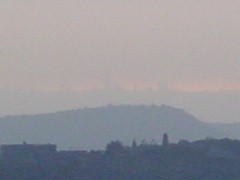 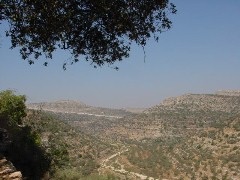 The
sounds of Zababdeh: The
sounds of Zababdeh:
4:45 AM, Muslim prayer (40 sec.) 6:00 AM, Church bells (40 sec.) 6:30 AM, sheep 7:30 AM, National Anthem (40 sec.) 24-7, Electrical generator (5 sec.) All night long, cow (14 sec.) Night-time, shooting (5 sec.) |
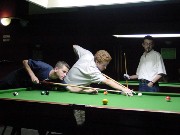 8/3/01:
It seems like we've actually spent a few days doing nothing of note - nerding
out, being quiet, keeping to ourselves, getting some good rest. Part
of the reason is that today is Friday, and this morning we had our oral
midterm exams for Arabic. The univeristy is closed on Fridays, so
we planned to meet our professor at a restaurant in Ramallah ("Checkers"
was one of the possibilities - yes, the same American chain) and converse
in colloquial Arabic. But on Fridays, there's not a restaurant in
Ramallah open at 9:00 AM, so we had a strolling exam. Later on we
connected with friends for a couple of games of cards before heading off
to the Ramallah pool hall (Elizabeth was the only woman there, and the
bathroom near our pool table had no door) for a few games of pathos pool
with fellow Birzeit students (foreigners and locals). Marthame preferred
to hit the arcade games and the foosball table. 8/3/01:
It seems like we've actually spent a few days doing nothing of note - nerding
out, being quiet, keeping to ourselves, getting some good rest. Part
of the reason is that today is Friday, and this morning we had our oral
midterm exams for Arabic. The univeristy is closed on Fridays, so
we planned to meet our professor at a restaurant in Ramallah ("Checkers"
was one of the possibilities - yes, the same American chain) and converse
in colloquial Arabic. But on Fridays, there's not a restaurant in
Ramallah open at 9:00 AM, so we had a strolling exam. Later on we
connected with friends for a couple of games of cards before heading off
to the Ramallah pool hall (Elizabeth was the only woman there, and the
bathroom near our pool table had no door) for a few games of pathos pool
with fellow Birzeit students (foreigners and locals). Marthame preferred
to hit the arcade games and the foosball table. |
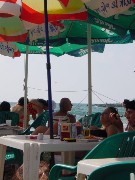 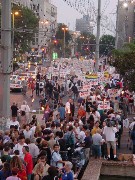 8/4/01:
We've been looking forward to our plans for the rest of the weekend, for
events in Tel Aviv and Jerusalem. First Tel Aviv, where we arrived
in a shared taxi from the Damascus Gate (Saturday is Shabbat, and so there
are virtually no busses running in Israel), along with a real smattering
of internationals living here - Nigerians, Ghanaians, Filipinos...Marthame
sat next to an Arab from East Jerusalem, but finding this out was difficult.
People who live in Jerusalem live an interesting life, never knowing whose
"side" anyone is on - for some there are obvious physical clues, but sometimes
there are none. When Marthame asked him where he was from, he said,
"Jerusalem." When he asked him where in Jerusalem, he said, "outside
the Old City" - always very careful to make it unclear whether he was Jewish
or Arab. Finally Marthame said, "We live near Jenin," which permitted
him to tell his story a little more openly. En route, he pointed
out where many Palestinian villages were located before they were destroyed
during and after the 1948 War. We walked from the bus station to
the water - Tel Aviv on Saturday is a lot like Ramallah on Friday, with
everything closed up. We spent most of the afternoon hanging out
at the beach, taking a nice dip in the Mediterranean, drinking really good
minty lemonade and enjoying a little leisure reading. Tonight there
was a large Peace Now
demonstration in Tel Aviv (video - 12 sec.),
which was calling on Sharon to stop escalating the situation, asking him
to move away from war and return to the negotiating table. We especially
wanted to come because we had also heard about the event from those who
were going to protest the demonstration, to make a stronger leftist stance,
with signs saying, "No peace now without right of return" and the like
from groups like Gush Shalom,
IndyMedia,
Intifada Solidarity, and the Socialists (as well as a few anarchists and
stragglers thrown in). The crowd was really big; we hustled to the
front of the line and stood on the sidewalk and watched the whole procession
pass by - it took a long time. Estimates run up to 100,000 demonstrators.
It was heartening to see so many people call for a halt to hostilities,
particularly when hostilities are so popular within Israel and Palestine
these days. And it was exciting to see (what we consider) a healthy variety
of opinions within the "peace camp." Unfortunately, we saw only a very
few Arab Israelis (who represent approximately 20% of Israel's population)
participating in the march; at times it seemed a bit strange for Jewish
Israelis to argue amongst themselves about how generous they were going
to be towards the Palestinians. We were anticipating heading back to Jerusalem,
because tomorrow morning a small group was hoping to stop some planned
home demolitions set to take place in Shua'afat Refugee Camp near Jerusalem.
Instead, we found out that the families had been granted a second hearing,
so we would meet at the court in the morning. We spent the rest of
the cool evening at a Tel Aviv theater watching the latest Hollywood nonsense
(starring John Cusack :-). 8/4/01:
We've been looking forward to our plans for the rest of the weekend, for
events in Tel Aviv and Jerusalem. First Tel Aviv, where we arrived
in a shared taxi from the Damascus Gate (Saturday is Shabbat, and so there
are virtually no busses running in Israel), along with a real smattering
of internationals living here - Nigerians, Ghanaians, Filipinos...Marthame
sat next to an Arab from East Jerusalem, but finding this out was difficult.
People who live in Jerusalem live an interesting life, never knowing whose
"side" anyone is on - for some there are obvious physical clues, but sometimes
there are none. When Marthame asked him where he was from, he said,
"Jerusalem." When he asked him where in Jerusalem, he said, "outside
the Old City" - always very careful to make it unclear whether he was Jewish
or Arab. Finally Marthame said, "We live near Jenin," which permitted
him to tell his story a little more openly. En route, he pointed
out where many Palestinian villages were located before they were destroyed
during and after the 1948 War. We walked from the bus station to
the water - Tel Aviv on Saturday is a lot like Ramallah on Friday, with
everything closed up. We spent most of the afternoon hanging out
at the beach, taking a nice dip in the Mediterranean, drinking really good
minty lemonade and enjoying a little leisure reading. Tonight there
was a large Peace Now
demonstration in Tel Aviv (video - 12 sec.),
which was calling on Sharon to stop escalating the situation, asking him
to move away from war and return to the negotiating table. We especially
wanted to come because we had also heard about the event from those who
were going to protest the demonstration, to make a stronger leftist stance,
with signs saying, "No peace now without right of return" and the like
from groups like Gush Shalom,
IndyMedia,
Intifada Solidarity, and the Socialists (as well as a few anarchists and
stragglers thrown in). The crowd was really big; we hustled to the
front of the line and stood on the sidewalk and watched the whole procession
pass by - it took a long time. Estimates run up to 100,000 demonstrators.
It was heartening to see so many people call for a halt to hostilities,
particularly when hostilities are so popular within Israel and Palestine
these days. And it was exciting to see (what we consider) a healthy variety
of opinions within the "peace camp." Unfortunately, we saw only a very
few Arab Israelis (who represent approximately 20% of Israel's population)
participating in the march; at times it seemed a bit strange for Jewish
Israelis to argue amongst themselves about how generous they were going
to be towards the Palestinians. We were anticipating heading back to Jerusalem,
because tomorrow morning a small group was hoping to stop some planned
home demolitions set to take place in Shua'afat Refugee Camp near Jerusalem.
Instead, we found out that the families had been granted a second hearing,
so we would meet at the court in the morning. We spent the rest of
the cool evening at a Tel Aviv theater watching the latest Hollywood nonsense
(starring John Cusack :-). |
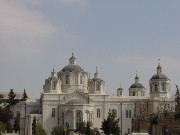 8/5/01:
As we made our way from the hostel to the bus station, we stopped at SPNI,
the Society for the Protection of Nature
in Israel. This organization has published some wonderful maps,
as well as some interesting books (flora, fauna, insects, etc.) on the
area - unfortunately, most of them have yet to be translated into English,
and Marthame's Biblical Hebrew ("God said, 'Moses, Moses.' Moses
said, 'Here I am.'") doesn't help when it comes to millipedes, scorpions,
and roly-polys. We then caught another shared taxi back to Jerusalem,
this time sharing it with Filipinos, Indians, and Israelis - both Jewish
and Arab. One Israeli woman turned out to be insane, and one of the
Indian women (whom she was harrassing and generally freaking out by alternately
growling at her and kissing her arm) asked to be let out by the side of
the highway rather than endure the rest of the trip (luckily, things calmed
down and both of them arrived at their destinations without being left
by the side of the road). Never a dull moment...Upon arriving in
the New City of Jerusalem, the young Arab who had been riding up front
hopped out at his stop and was immediately surrounded by four or five soldiers
and police, asking for his ID and going through his bags. We have
seen this repeated on Arab men all over the new city. How humiliating
it must be. We arrived at the home demolition hearing to be informed by
Rabbi Asherman of Rabbis
for Human Rights that it had been moved to another location (rather
than the court building in the area of Jerusalem known as the Russian Compound,
where you find the beautiful Russian Orthodox Cathedral) and then postponed.
Rabbi Asherman seemed confident that this was a good sign, and was buying
more time for the families, as it was highly unlikely (although not without
precedent) that the government would go ahead and demolish them without
the court hearing. 8/5/01:
As we made our way from the hostel to the bus station, we stopped at SPNI,
the Society for the Protection of Nature
in Israel. This organization has published some wonderful maps,
as well as some interesting books (flora, fauna, insects, etc.) on the
area - unfortunately, most of them have yet to be translated into English,
and Marthame's Biblical Hebrew ("God said, 'Moses, Moses.' Moses
said, 'Here I am.'") doesn't help when it comes to millipedes, scorpions,
and roly-polys. We then caught another shared taxi back to Jerusalem,
this time sharing it with Filipinos, Indians, and Israelis - both Jewish
and Arab. One Israeli woman turned out to be insane, and one of the
Indian women (whom she was harrassing and generally freaking out by alternately
growling at her and kissing her arm) asked to be let out by the side of
the highway rather than endure the rest of the trip (luckily, things calmed
down and both of them arrived at their destinations without being left
by the side of the road). Never a dull moment...Upon arriving in
the New City of Jerusalem, the young Arab who had been riding up front
hopped out at his stop and was immediately surrounded by four or five soldiers
and police, asking for his ID and going through his bags. We have
seen this repeated on Arab men all over the new city. How humiliating
it must be. We arrived at the home demolition hearing to be informed by
Rabbi Asherman of Rabbis
for Human Rights that it had been moved to another location (rather
than the court building in the area of Jerusalem known as the Russian Compound,
where you find the beautiful Russian Orthodox Cathedral) and then postponed.
Rabbi Asherman seemed confident that this was a good sign, and was buying
more time for the families, as it was highly unlikely (although not without
precedent) that the government would go ahead and demolish them without
the court hearing. 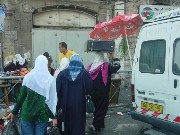 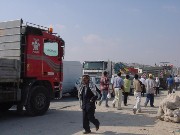 We
met some interesting people at the non-hearing and had lunch with them,
one an American Jewish professor/tourbook writer, the other an American
Jewish student/activist. Nothing like hanging out with tourbook writers
to get you the best, cheapest deal on food. We then poked our heads
in at the Alternative Information
Center, about which we had heard a great deal (they've been very active
in supporting justice work; we'd heard about them especially for their
activism opposing home demolitions). Finally, we headed back to Birzeit
to do our homework like good little boys and girls. We caught our
taxi from Damascus Gate, which is always such a Eastern cultural counterpoint
to the Western feel of the New City, and were dropped off at the Qalandiya
checkpoint. It had been closed for a while, and we walked a good
twenty minutes in the heat of the day along with all Palestinian walks
of life before we got through the huge snarl of backed up traffic and headed
into Ramallah. By the time we got back to Birzeit (whose checkpoint
was open), we were happy to crawl into bed early and not move until morning. We
met some interesting people at the non-hearing and had lunch with them,
one an American Jewish professor/tourbook writer, the other an American
Jewish student/activist. Nothing like hanging out with tourbook writers
to get you the best, cheapest deal on food. We then poked our heads
in at the Alternative Information
Center, about which we had heard a great deal (they've been very active
in supporting justice work; we'd heard about them especially for their
activism opposing home demolitions). Finally, we headed back to Birzeit
to do our homework like good little boys and girls. We caught our
taxi from Damascus Gate, which is always such a Eastern cultural counterpoint
to the Western feel of the New City, and were dropped off at the Qalandiya
checkpoint. It had been closed for a while, and we walked a good
twenty minutes in the heat of the day along with all Palestinian walks
of life before we got through the huge snarl of backed up traffic and headed
into Ramallah. By the time we got back to Birzeit (whose checkpoint
was open), we were happy to crawl into bed early and not move until morning. |
|
8/6/01: In the evening, we took a nice walk over to the Latin Convent's restaurant to hang out with some friends from the program. To our surprise, we ran into three of Marthame's 12th grade students from last year, as well as two Zababdeh-ites who are currently studying at Birzeit. We called ourselves the Zababdeh settlement and talked about last year's headaches, good times, and their dreams as they all head off to college next year. One of their friends who is from Birzeit came over and recounted his story of getting grazed by a bullet in the skull at the Birzeit checkpoint a few months back. Nothing like that to sober us up from our dreaming. |
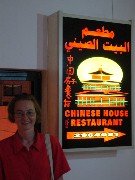 8/7/01:
OK - we've only got a little more time in Ramallah, so we're going to make
the most of it. The overwhelming realization that we've got to head
back to Zababdeh soon (and thus back to work) is starting to dawn on us,
so we headed into town for a little dinner for two. Ramallah has
such an incredible energy (and such an incredible amount of neon!) for
such a small city (only about 30,000). We found ourselves in quite
the surreal location - at the building which houses Ramallah's Mexican
restaurant and one of its Chinese restaurants. Interesting choices,
huh? We decided on Chinese based on recommendations (we had been
told it's the best restaurant in Ramallah) and weren't disappointed.
The owner is from the Ramallah-Jerusalem area, and his background is in
hotel management. The chef and his assistant are from Beijing and
are here for three years. Didn't see any pork fried rice on the menu,
though... 8/7/01:
OK - we've only got a little more time in Ramallah, so we're going to make
the most of it. The overwhelming realization that we've got to head
back to Zababdeh soon (and thus back to work) is starting to dawn on us,
so we headed into town for a little dinner for two. Ramallah has
such an incredible energy (and such an incredible amount of neon!) for
such a small city (only about 30,000). We found ourselves in quite
the surreal location - at the building which houses Ramallah's Mexican
restaurant and one of its Chinese restaurants. Interesting choices,
huh? We decided on Chinese based on recommendations (we had been
told it's the best restaurant in Ramallah) and weren't disappointed.
The owner is from the Ramallah-Jerusalem area, and his background is in
hotel management. The chef and his assistant are from Beijing and
are here for three years. Didn't see any pork fried rice on the menu,
though... |
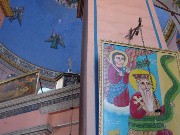 8/8/01:
Elizabeth headed from class into Jerusalem while Marthame went back home
to do some chores. She headed into the Ethiopian church (just north
of the Russian Compound, on Ethiopia street), whose existence we have only
known about recently, to admire its icons and architecture. It was very
beautiful, and the icons were lovely - many were of saints who had created
monasteries in Ethiopia. we hope to learn more about Ethiopia - it has
such a fascinating history (with a history of Judaism and claims on the
line of David through the child born to the Queen of Sheba and Solomon,
and a history of Christianity noted in Acts, when Philip explains Scripture
to the Ethiopian eunuch). We also got word that today the followers
of Meir Kahane were holding a rally in Jerusalem. Kahane's family
members and followers are part of the radical right, the Jewish supremacists.
He was martyred for the cause, as were some of his followers. Their party,
the Koch Party, was declared illegal by the Israeli government for being
explicitely racist (We were told that this rally was technically legal
because they organized it not as the Koch Party, but simply as individuals).
Some leftists decided to organize a counter-demonstration. The police
did their best to keep them separated by an intersection, but there was
enough mixing to make it interesting. Kahane's followers are essentially
calling for the ethnic-cleansing of Israel of all Arabs. They have
made bumper stickers that read, "No Arabs, No Terrorists" in Hebrew - in
other words, you get rid of all the Arabs, you get rid of all the terrorists.
Easy solution. The counter-demonstrators had hung up a sign saying 8/8/01:
Elizabeth headed from class into Jerusalem while Marthame went back home
to do some chores. She headed into the Ethiopian church (just north
of the Russian Compound, on Ethiopia street), whose existence we have only
known about recently, to admire its icons and architecture. It was very
beautiful, and the icons were lovely - many were of saints who had created
monasteries in Ethiopia. we hope to learn more about Ethiopia - it has
such a fascinating history (with a history of Judaism and claims on the
line of David through the child born to the Queen of Sheba and Solomon,
and a history of Christianity noted in Acts, when Philip explains Scripture
to the Ethiopian eunuch). We also got word that today the followers
of Meir Kahane were holding a rally in Jerusalem. Kahane's family
members and followers are part of the radical right, the Jewish supremacists.
He was martyred for the cause, as were some of his followers. Their party,
the Koch Party, was declared illegal by the Israeli government for being
explicitely racist (We were told that this rally was technically legal
because they organized it not as the Koch Party, but simply as individuals).
Some leftists decided to organize a counter-demonstration. The police
did their best to keep them separated by an intersection, but there was
enough mixing to make it interesting. Kahane's followers are essentially
calling for the ethnic-cleansing of Israel of all Arabs. They have
made bumper stickers that read, "No Arabs, No Terrorists" in Hebrew - in
other words, you get rid of all the Arabs, you get rid of all the terrorists.
Easy solution. The counter-demonstrators had hung up a sign saying 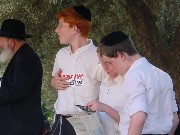 "No
Arabs, No Hummus" in reply. Before the demonstrations actually began, we
saw a number of very animated and passionate conversations as members of
both groups mingled a bit. At first, the saddest part was the children
whose their anger and hatred were palpable (video
- 8 sec.). Once the demonstrations began, most of the counter demonstrators
stood at the street corner holding signs for passers-by, traffic, and the
Kahane group to see. Most of the Kahane crowd stayed in the small city
park listening to the speeches. However, quite a few folks from the media
and probably from the counter demonstrators went over to take photographs
(often unwelcome) of the Kahane group. We also saw a few tough-looking
youth, whose demeanor and actions made us think of skinheads in the States.
We saw them more than once come over and hassle counter-demonstrators and
tear up their "End Racism" signs. Then the saddest part was that so many
passers-by were taking the Kahane group's free bumper stickers. We
left the scene a little early for dinner with a couple of friends who have
been working with pacifist groups over the past two weeks. Jerry
and Sis Levin are Birminghamites who have worked diligently for the cause
of peace. Their story is told in Sis's book,
Beirut
Diary, which tells of Jerry's kidnapping in Lebanon, his year-long
hostage ordeal, the US's unwillingness to help and even their interference,
and Sis's bravery to break the silence. Theirs is an unbelievable
story, illustrating some of the complexities and tragedies of the situation
in the Middle East in the 1980s - so many of which spill over to today.
Marthame caught the taxis back to Birzeit (unremarkable except for the
driver whom we all thought was deaf until we figured out he was simply
mute) while Elizabeth headed off to a party at a friend's in Jerusalem. "No
Arabs, No Hummus" in reply. Before the demonstrations actually began, we
saw a number of very animated and passionate conversations as members of
both groups mingled a bit. At first, the saddest part was the children
whose their anger and hatred were palpable (video
- 8 sec.). Once the demonstrations began, most of the counter demonstrators
stood at the street corner holding signs for passers-by, traffic, and the
Kahane group to see. Most of the Kahane crowd stayed in the small city
park listening to the speeches. However, quite a few folks from the media
and probably from the counter demonstrators went over to take photographs
(often unwelcome) of the Kahane group. We also saw a few tough-looking
youth, whose demeanor and actions made us think of skinheads in the States.
We saw them more than once come over and hassle counter-demonstrators and
tear up their "End Racism" signs. Then the saddest part was that so many
passers-by were taking the Kahane group's free bumper stickers. We
left the scene a little early for dinner with a couple of friends who have
been working with pacifist groups over the past two weeks. Jerry
and Sis Levin are Birminghamites who have worked diligently for the cause
of peace. Their story is told in Sis's book,
Beirut
Diary, which tells of Jerry's kidnapping in Lebanon, his year-long
hostage ordeal, the US's unwillingness to help and even their interference,
and Sis's bravery to break the silence. Theirs is an unbelievable
story, illustrating some of the complexities and tragedies of the situation
in the Middle East in the 1980s - so many of which spill over to today.
Marthame caught the taxis back to Birzeit (unremarkable except for the
driver whom we all thought was deaf until we figured out he was simply
mute) while Elizabeth headed off to a party at a friend's in Jerusalem. |
|
8/9/01: Days here gets stranger and more difficult. We had made plans after class to head to Qalandiya, a major checkpoint between Ramallah and Jerusalem, to connect with a member of Checkpoint Watch. Checkpoint Watch is a group of volunteers (largely internationals) who have responded to reports of human rights abuses at checkpoints. They watch, they record, and sometimes they intervene. Some soldiers seem to resent them; others simply disregard them. As we left the university word came of an explosion in Jerusalem. The initial reports we heard were of a few injuries, and so we headed out, knowing that there would be some activity at the checkpoint. Terrorist violence by Palestinians usually prompts collective retaliation on the Palestinian public. To get to Jerusalem, we had to pass the Surda checkpoint (usually about four soldiers, a tank, a jeep, and several cement blocks) between Birzeit and Ramallah. When we got there, it was clear that something was afoot. We sat with a couple of friends from our program (also Checkpoint Watch volunteers, who came out at a moment's notice) to see what was happening. 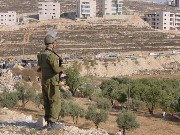 We
arrived at 4:15, and about five minutes later the road was closed to all
Palestinian traffic and to and pedestrians leaving Ramallah (until now,
we had not seen real closures on pedestrians - just delays and ID checks).
The soldiers were usually letting old women and very old men walk through.
We intervened in a few cases - a sick baby, an elderly man, etc. - but
at first mostly watched, took notes and pictures (until Marthame was threatened
by a soldier with camera confiscation). Our friend, who spoke a little
Hebrew, asked why this was happening. "It's revenge," said the soldier.
It was after that when we learned the truth of what had happened in Jerusalem
- the suicide bomber entered the pizza restaurant and killed fourteen people
in addition to himself, and injured between eighty and ninety others. Our
friend who carried the news to us kept shaking his head, saying, "Haram"
- that is, totally contrary to the law and will of God. We
arrived at 4:15, and about five minutes later the road was closed to all
Palestinian traffic and to and pedestrians leaving Ramallah (until now,
we had not seen real closures on pedestrians - just delays and ID checks).
The soldiers were usually letting old women and very old men walk through.
We intervened in a few cases - a sick baby, an elderly man, etc. - but
at first mostly watched, took notes and pictures (until Marthame was threatened
by a soldier with camera confiscation). Our friend, who spoke a little
Hebrew, asked why this was happening. "It's revenge," said the soldier.
It was after that when we learned the truth of what had happened in Jerusalem
- the suicide bomber entered the pizza restaurant and killed fourteen people
in addition to himself, and injured between eighty and ninety others. Our
friend who carried the news to us kept shaking his head, saying, "Haram"
- that is, totally contrary to the law and will of God. 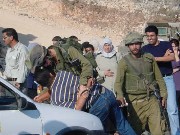 There's
no other word for it, no emotion to express it, no way to justify it. More
dead children; more dead parents and innocents - it makes our minds spin
as the numbers increase; we cannot really fully comprehend the agony brought
by the hundreds of civilian deaths in this tragic conflict. For three
hours we stayed there, kind of in shock both from the news and from what
we witnessed at the checkpoint. We had learned about the bombing the way
most Palestinians do - disconnected from it personally (the bomber apparently
was from 'Aqaba, not far from Zababdeh, but very far from Birzeit) but
living the consequences of the punishment. Six young men were detained,
squatting in the hot sun near the army jeep for about an hour and a half,
one with his arms bound behind his back with plastic ties. Elizabeth
tried to give grapes to them, and was turned back by the soldiers - but
she was allowed to give them water. When asked why they didn't have
water for the detainees, a soldier said that they didn't have the resources
with them to detain them properly - to do that, he'd have to send them
to a center for at least 96 hours, and none of us want that, do we? Crowds
of people, hot and tired after a day of work in Ramallah, persistently
tried to get across, each time being turned back. Eventually, one of the
soldiers permitted women and children across, so it was only men waiting
to cross out of Ramallah. During our stay, the army set off eight
sound bombs (one of our number was hit in the leg by its plastic shrapnel;
the soldiers quickly gave her a bandage) and four tear gas canisters (most
of which were shot into the nearby fields, where people were trying to
walk around the checkpoint - video - 5
sec.). Not a single stone was thrown, not one shoving of a soldier,
nothing. Everyone there was probably afraid of the consequences given
the death toll in Jerusalem. After an hour or so of teetering chaos, five
more jeeps and ten more soldiers showed up. Several times, we saw
one, whom we nicknamed "Rambo," put his arm around a Palestinian's neck
in a headlock, and whisper in his ear, then manhandle him (shove him down
on the hood of a car, twist his arm behind his back, shove his face into
the jeep, etc.) and then usually send him back toward Ramallah (if not
"unofficially" detain him). The road was opened for a few minutes
at 5:45 to all pedestrian traffic, so everyone who had been waiting hustled
through, to the waiting shared taxis on the other side. After maybe ten
minutes, the passage was closed again so that any man passing out of Ramallah
had his ID checked; most were permitted to pass; some were not. Apparently
the soldiers were checking if men were in the Barghouti family (perhaps
out of concern for retaliation for the failed assassination attempt on
Fatah leader Marwan Barghouti) We debated whether to proceed onto
Ramallah, and finally decided to leave around 7:30. There's
no other word for it, no emotion to express it, no way to justify it. More
dead children; more dead parents and innocents - it makes our minds spin
as the numbers increase; we cannot really fully comprehend the agony brought
by the hundreds of civilian deaths in this tragic conflict. For three
hours we stayed there, kind of in shock both from the news and from what
we witnessed at the checkpoint. We had learned about the bombing the way
most Palestinians do - disconnected from it personally (the bomber apparently
was from 'Aqaba, not far from Zababdeh, but very far from Birzeit) but
living the consequences of the punishment. Six young men were detained,
squatting in the hot sun near the army jeep for about an hour and a half,
one with his arms bound behind his back with plastic ties. Elizabeth
tried to give grapes to them, and was turned back by the soldiers - but
she was allowed to give them water. When asked why they didn't have
water for the detainees, a soldier said that they didn't have the resources
with them to detain them properly - to do that, he'd have to send them
to a center for at least 96 hours, and none of us want that, do we? Crowds
of people, hot and tired after a day of work in Ramallah, persistently
tried to get across, each time being turned back. Eventually, one of the
soldiers permitted women and children across, so it was only men waiting
to cross out of Ramallah. During our stay, the army set off eight
sound bombs (one of our number was hit in the leg by its plastic shrapnel;
the soldiers quickly gave her a bandage) and four tear gas canisters (most
of which were shot into the nearby fields, where people were trying to
walk around the checkpoint - video - 5
sec.). Not a single stone was thrown, not one shoving of a soldier,
nothing. Everyone there was probably afraid of the consequences given
the death toll in Jerusalem. After an hour or so of teetering chaos, five
more jeeps and ten more soldiers showed up. Several times, we saw
one, whom we nicknamed "Rambo," put his arm around a Palestinian's neck
in a headlock, and whisper in his ear, then manhandle him (shove him down
on the hood of a car, twist his arm behind his back, shove his face into
the jeep, etc.) and then usually send him back toward Ramallah (if not
"unofficially" detain him). The road was opened for a few minutes
at 5:45 to all pedestrian traffic, so everyone who had been waiting hustled
through, to the waiting shared taxis on the other side. After maybe ten
minutes, the passage was closed again so that any man passing out of Ramallah
had his ID checked; most were permitted to pass; some were not. Apparently
the soldiers were checking if men were in the Barghouti family (perhaps
out of concern for retaliation for the failed assassination attempt on
Fatah leader Marwan Barghouti) We debated whether to proceed onto
Ramallah, and finally decided to leave around 7:30. 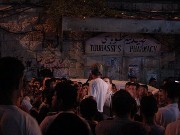 We
were glad we did, because we got into Ramallah in time for the Anglican
Church's young adult gathering. The priest, Fr. Samir Isaid, led
everyone in praying for those who were killed and injured today, for their
families, and ultimately for peace in this land. We
were glad we did, because we got into Ramallah in time for the Anglican
Church's young adult gathering. The priest, Fr. Samir Isaid, led
everyone in praying for those who were killed and injured today, for their
families, and ultimately for peace in this land. 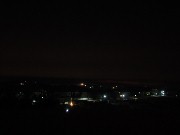 Amidst
all of what we experienced today - hearing the horrific news about the
deaths and injuries in Jerusalem, seeing man's inhumanity to man (and it
was almost uniquely male-driven) at the Birzeit checkpoint, and knowing
that there is a deep connection between the two - it was somewhat restorative
to hear that the dead were being mourned, and a flicker of hope remained
especially within the context of faith. As we drank tea and ate chocolate
cake after prayers, everyone watched the sky warily as airplanes flew overhead,
hoping their city would not be bombed again. As we headed back to catch
our taxi home, we saw a procession of about fifty young men firing guns
into the air and clearly celebrating that fifteen people had died (video
- 5 sec.) - so much for visions of hope. We grabbed a late dinner
at the Latin Convent, and Marthame chatted by phone with a friend whose
writing at the start of the Intifada had given us some sense of
hope. His ability to see the possibility for goodness and peace in
this land, and his deep love for this place have been important to us.
But for him, it's feeling more and more like never-neverland. Our
lullaby tonight was the F-16s coming to attack Ramallah (audio
- 26 sec.). Amidst
all of what we experienced today - hearing the horrific news about the
deaths and injuries in Jerusalem, seeing man's inhumanity to man (and it
was almost uniquely male-driven) at the Birzeit checkpoint, and knowing
that there is a deep connection between the two - it was somewhat restorative
to hear that the dead were being mourned, and a flicker of hope remained
especially within the context of faith. As we drank tea and ate chocolate
cake after prayers, everyone watched the sky warily as airplanes flew overhead,
hoping their city would not be bombed again. As we headed back to catch
our taxi home, we saw a procession of about fifty young men firing guns
into the air and clearly celebrating that fifteen people had died (video
- 5 sec.) - so much for visions of hope. We grabbed a late dinner
at the Latin Convent, and Marthame chatted by phone with a friend whose
writing at the start of the Intifada had given us some sense of
hope. His ability to see the possibility for goodness and peace in
this land, and his deep love for this place have been important to us.
But for him, it's feeling more and more like never-neverland. Our
lullaby tonight was the F-16s coming to attack Ramallah (audio
- 26 sec.). |
|
8/10/01: Without much rest and still reeling from all of the events of yesterday, we rubbed the sleep from our eyes as we made our way from Birzeit. The scene at the Surda checkpoint (between Birzeit and Ramallah) was a lot calmer than yesterday. In Ramallah, we connected with our group; this was our first chance to go on one of the Birzeit-organized trips for the students in the PAS (Palestine and Arabic Studies) program. We made our way from Ramallah to Jerusalem (past the Orient House that was seized last night) and headed off to Haifa. 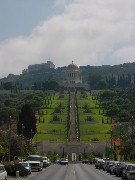 We
arrived at the Baha'i Temple - where Marthame had been with his family
in April - to find the shrine closed for
renovations. Still, the gardens and the view were spectacular (video
- 5 sec.). We then met up with our guide for the next few days, a
woman working for an organization called Ittijah
that does advocacy work for Palestinians who are Israeli citizens (sometimes
referred to as Arab Israelis). She told us a bit about Haifa's Arabic
community (now down to only 8% of the population, a mere fraction of its
pre-1948 population). We
arrived at the Baha'i Temple - where Marthame had been with his family
in April - to find the shrine closed for
renovations. Still, the gardens and the view were spectacular (video
- 5 sec.). We then met up with our guide for the next few days, a
woman working for an organization called Ittijah
that does advocacy work for Palestinians who are Israeli citizens (sometimes
referred to as Arab Israelis). She told us a bit about Haifa's Arabic
community (now down to only 8% of the population, a mere fraction of its
pre-1948 population). 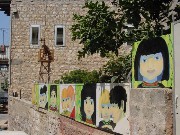 One
of the "co-existence" projects sponsored by the municipality of Haifa is
an annual commissioning of artists to do work in the Arab neighborhood,
along a "pathway of co-existence" tour. This is supposed to be an example
of partnership and peace between Arabs and Jews. The idea seems great,
however we learned that the project was created and executed without input
from the Arab community. Installations are painted and placed on peopleís
houses without their consent - portraits of Russian-looking children, an
Israeli flag with a mirror where the star of David usually resides, sculptures
of naked torsos with babies chained to them; we suspect that these were
often not the things that would appeal to an Arab aesthetic. We also
visited with a young, dynamic lawyer from Adalah, the Legal
Center for Arab Minority Rights in Israel. He was quite impressive
- very articulate, intelligent, and focused. We heard once again
a call for the one-state vision of Jews and Arabs which has grabbed our
attention more than once. After our meeting, we enjoyed some pretty
remarkable panoramas of Haifa and the Mediterranean Sea before heading
off to Sakhneen, our resting place for the night (but we were far from
resting yet). Sakhneen is an Arab town (approximately 25,000 people)
in the Galilee, and it is is fairly typical of Arab villages within Israel.
It sits in a valley, is succumbing to overcrowding, and is surrounded by
Israeli all-Jewish "settlements" (it was the first time we heard this word
applied to Jewish communities outside of the West Bank and Gaza).
The similarities West Bank settlements (acknowledged internationally as
illegal) and many of these communities within the state of Israel (particularly
in the Galilee) were striking. In both the Occupied Territories and Israel,
huge tracts of land were confiscated from Palestinian owners and put under
Israeli control. This wholesale confiscation of land came mostly to a halt
within Israel after 1976, when Palestinians organized widespread protests
of the confiscation of their land. Twelve Arab Israelis were killed in
the repression of the protest, and are still remembered as martyrs for
Palestinian rights. While confiscation in Israel mostly stopped then,
the systematic repression and control of Palestinian lands continues, mostly
through zoning laws (which Arab Israelis have very little influence on).
For example, our hosts for the evening are living with their children in
a house that is illegal according to Israeli law. They built it on
land they own - no one disputes that, not even the courts - but it has
been zoned for agriculture. One
of the "co-existence" projects sponsored by the municipality of Haifa is
an annual commissioning of artists to do work in the Arab neighborhood,
along a "pathway of co-existence" tour. This is supposed to be an example
of partnership and peace between Arabs and Jews. The idea seems great,
however we learned that the project was created and executed without input
from the Arab community. Installations are painted and placed on peopleís
houses without their consent - portraits of Russian-looking children, an
Israeli flag with a mirror where the star of David usually resides, sculptures
of naked torsos with babies chained to them; we suspect that these were
often not the things that would appeal to an Arab aesthetic. We also
visited with a young, dynamic lawyer from Adalah, the Legal
Center for Arab Minority Rights in Israel. He was quite impressive
- very articulate, intelligent, and focused. We heard once again
a call for the one-state vision of Jews and Arabs which has grabbed our
attention more than once. After our meeting, we enjoyed some pretty
remarkable panoramas of Haifa and the Mediterranean Sea before heading
off to Sakhneen, our resting place for the night (but we were far from
resting yet). Sakhneen is an Arab town (approximately 25,000 people)
in the Galilee, and it is is fairly typical of Arab villages within Israel.
It sits in a valley, is succumbing to overcrowding, and is surrounded by
Israeli all-Jewish "settlements" (it was the first time we heard this word
applied to Jewish communities outside of the West Bank and Gaza).
The similarities West Bank settlements (acknowledged internationally as
illegal) and many of these communities within the state of Israel (particularly
in the Galilee) were striking. In both the Occupied Territories and Israel,
huge tracts of land were confiscated from Palestinian owners and put under
Israeli control. This wholesale confiscation of land came mostly to a halt
within Israel after 1976, when Palestinians organized widespread protests
of the confiscation of their land. Twelve Arab Israelis were killed in
the repression of the protest, and are still remembered as martyrs for
Palestinian rights. While confiscation in Israel mostly stopped then,
the systematic repression and control of Palestinian lands continues, mostly
through zoning laws (which Arab Israelis have very little influence on).
For example, our hosts for the evening are living with their children in
a house that is illegal according to Israeli law. They built it on
land they own - no one disputes that, not even the courts - but it has
been zoned for agriculture. 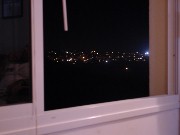 The
houses on all three sides of his are legal houses belonging to Palestinian
Israelis within Sakhneen, but because the surveying maps have a tooth-saw
cut, his house is built illegally. For years it has languished in
the courts, put under demolition order, and he himself was recently taken
off of 24-hour house arrest (now heís confined to home at nights) - all
a bit extreme for someone building on his own land, it seemed. Meanwhile
the lights of one of the nearby Jewish towns (built on land belonging to
residents of Sakhneen) flashed through the window. He shared with
us his vision of this place, one in which international borders (largely
legacies of European colonial rule) break open and people in the Galilee
can go to the markets in Beirut and Damascus. Naive perhaps, or visionary,
but he brought it into our conversation as part of his memories of the
not-so-distant past when his family had a stronger connection to those
two cities than to Jerusalem. We crashed in a beautiful hostel in
the village which had - luxury of luxuries - air-conditioning! The
houses on all three sides of his are legal houses belonging to Palestinian
Israelis within Sakhneen, but because the surveying maps have a tooth-saw
cut, his house is built illegally. For years it has languished in
the courts, put under demolition order, and he himself was recently taken
off of 24-hour house arrest (now heís confined to home at nights) - all
a bit extreme for someone building on his own land, it seemed. Meanwhile
the lights of one of the nearby Jewish towns (built on land belonging to
residents of Sakhneen) flashed through the window. He shared with
us his vision of this place, one in which international borders (largely
legacies of European colonial rule) break open and people in the Galilee
can go to the markets in Beirut and Damascus. Naive perhaps, or visionary,
but he brought it into our conversation as part of his memories of the
not-so-distant past when his family had a stronger connection to those
two cities than to Jerusalem. We crashed in a beautiful hostel in
the village which had - luxury of luxuries - air-conditioning! |
|
8/11/01: Today was a day of visits, one right after the other. The first was to al-Zahra'a, a women's organization in Sakhneen which is trying to deal with many of the issues affecting women in Palestinian Israeli society. It seems that the problems are compounded here, as women are faced with not only daily discrimination as second-class citizens in Israel, but also because of the sexism of retro-traditional Arab communities. She confirmed what we had heard from others before, that the status of women among Palestinians within Israel is often lower than it is in Palestine. Nevertheless, the organization has been able to engage in quite a few initiatives. We then found our highlight of the day - or rather, he found us. 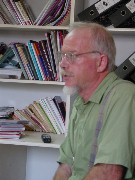 Dr.
Uri Davis is, in his own words, "A Jew born in Palestine," (born in
1943, he likes to point out that his statement is both technically and
also ethically correct). An academic and a human rights activist, Dr. Davis
began to explain to us - patiently and clearly - how it is that Israel
has established a racist state with a sheen of credibility. An example:
the settlements that surround Sakhneen are all-Jewish. Arabs cannot
live there - but it doesnít say that anywhere. Instead, rules use
other terms to exclude Arabs. Some state that you can live there if you
are eligible for "Aliya" (Jewish return to the land); some require evidence
of military service (generally not open to Arabs except for the Druze minority),
or you will "fit in socially" with the rest of the residents (i.e. you
are Jewish). He has spent much of his recent activist time with an
organization called Al-Beit which uses the court system to find cracks
in the system, hoping to establish precedents that may change the face
of the land. He has used the legal tools at his disposal to move
an Arab family into an all-Jewish settlement that was built on their family
lands. After talking with us, he headed off to the United Nations
World Conference Against Racism in Durban, South Africa and left us in
the hands of the Committee for the Defense of the Internally Displaced,
an organization that works with the Palestinian population who were expelled
from their villages in the 1948 War but remained within what became Israel.
Like all Arabs here, they lived from 1948 to 1966 under military rule (similar
to how Palestinians in the Occupied Territories live today, a system perfected
in Israel proper - according to Dr. Davis). Most of the internally
displaced have since been integrated into their adopted villages, but many
still dream of returning home. Dr.
Uri Davis is, in his own words, "A Jew born in Palestine," (born in
1943, he likes to point out that his statement is both technically and
also ethically correct). An academic and a human rights activist, Dr. Davis
began to explain to us - patiently and clearly - how it is that Israel
has established a racist state with a sheen of credibility. An example:
the settlements that surround Sakhneen are all-Jewish. Arabs cannot
live there - but it doesnít say that anywhere. Instead, rules use
other terms to exclude Arabs. Some state that you can live there if you
are eligible for "Aliya" (Jewish return to the land); some require evidence
of military service (generally not open to Arabs except for the Druze minority),
or you will "fit in socially" with the rest of the residents (i.e. you
are Jewish). He has spent much of his recent activist time with an
organization called Al-Beit which uses the court system to find cracks
in the system, hoping to establish precedents that may change the face
of the land. He has used the legal tools at his disposal to move
an Arab family into an all-Jewish settlement that was built on their family
lands. After talking with us, he headed off to the United Nations
World Conference Against Racism in Durban, South Africa and left us in
the hands of the Committee for the Defense of the Internally Displaced,
an organization that works with the Palestinian population who were expelled
from their villages in the 1948 War but remained within what became Israel.
Like all Arabs here, they lived from 1948 to 1966 under military rule (similar
to how Palestinians in the Occupied Territories live today, a system perfected
in Israel proper - according to Dr. Davis). Most of the internally
displaced have since been integrated into their adopted villages, but many
still dream of returning home. 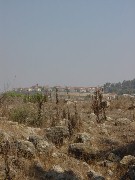 Our
host took us to his familyís former village of Mia'ar - nothing but rubble
abutting an all-Jewish town (built on Mia'ar's fields). He has spent
a great deal of time gathering oral histories from the people of the village,
as well as the Israeli soldiers who carried out the expulsion and destruction
of the village. Their stories are the same except for one point - the villagers
say that they left the older people of the village gathered in one house
at the edge of the village since they couldn't run fast enough to escape
to the hills. They returned to find them all shot and killed. The
Israeli soldiers deny this part of the narrative. He has also found
that most of the soldiers are willing to talk to him quite openly - until
he mentions the desire to return and rebuild the village, at which point
they tend to clam up. There seems to be a very clearly-drawn line,
even for those Palestinians who still live in Israel and have citizenship. Our
host took us to his familyís former village of Mia'ar - nothing but rubble
abutting an all-Jewish town (built on Mia'ar's fields). He has spent
a great deal of time gathering oral histories from the people of the village,
as well as the Israeli soldiers who carried out the expulsion and destruction
of the village. Their stories are the same except for one point - the villagers
say that they left the older people of the village gathered in one house
at the edge of the village since they couldn't run fast enough to escape
to the hills. They returned to find them all shot and killed. The
Israeli soldiers deny this part of the narrative. He has also found
that most of the soldiers are willing to talk to him quite openly - until
he mentions the desire to return and rebuild the village, at which point
they tend to clam up. There seems to be a very clearly-drawn line,
even for those Palestinians who still live in Israel and have citizenship. 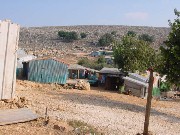 Our
next visit was to the village of 'Arab al Na'im, one of the unrecognized
villages in which Palestinian Israelis live. There are approximately
100,000 people living in them, totalling 10% of the Palestinian Israeli
population (most of them are in the Negev, but there are many in the Galilee
as well). They live in shacks like we had seen in Bedouin encampments,
without water or electricity or sewage. These villages mostly predate
the 1948 War, but for whatever reason they were not recognized as valid
by the Israeli government and were zoned for other purposes - agricultural
land, Jewish residences, etc. People in unrecognized villages are not allowed
to build permanent homes; when people have tried to improve their conditions
with, for example, a stone wall, they have had their homes bulldozed. This
village, however, is better-off since the Association
of Forty finally won this village official recognition. While
they now have a few communal water tanks (supplied from a European NGO),
they are still waiting for infrastructure such as electricity and roads.
Our guide pointed out that these people pay the same taxes as their Jewish
neighbors, so they should receive the same benefits as any other municipality.
The visit was quite odd, though, as we didnít meet with anyone in the village
and were told that people in 'Arab al Na'im often don't like their photos
taken. Suddenly we felt like we were on a "disaster tour" of Israel.
That uncomfortable feeling combined with depression about their living
conditions in a way that made us feel ashamed. Some people on the
trip began to comment how unaware they had been about the history and living
situation of Palestinian Israelis - how severe and unjust. Our final
stop for the day was the Golan Heights (which Israel annexed in the 1970s).
We arrived at our hosts and noted the flag on the wall - not the Palestinian,
but perhaps the Iraqi, we thought. It turned out to be Syrian, of
course - the Golan Heights belonged to Syria from 1948 until 1967 when
Israel captured it and expelled most of its population of 150,000 and levelled
most of their villages. Our
next visit was to the village of 'Arab al Na'im, one of the unrecognized
villages in which Palestinian Israelis live. There are approximately
100,000 people living in them, totalling 10% of the Palestinian Israeli
population (most of them are in the Negev, but there are many in the Galilee
as well). They live in shacks like we had seen in Bedouin encampments,
without water or electricity or sewage. These villages mostly predate
the 1948 War, but for whatever reason they were not recognized as valid
by the Israeli government and were zoned for other purposes - agricultural
land, Jewish residences, etc. People in unrecognized villages are not allowed
to build permanent homes; when people have tried to improve their conditions
with, for example, a stone wall, they have had their homes bulldozed. This
village, however, is better-off since the Association
of Forty finally won this village official recognition. While
they now have a few communal water tanks (supplied from a European NGO),
they are still waiting for infrastructure such as electricity and roads.
Our guide pointed out that these people pay the same taxes as their Jewish
neighbors, so they should receive the same benefits as any other municipality.
The visit was quite odd, though, as we didnít meet with anyone in the village
and were told that people in 'Arab al Na'im often don't like their photos
taken. Suddenly we felt like we were on a "disaster tour" of Israel.
That uncomfortable feeling combined with depression about their living
conditions in a way that made us feel ashamed. Some people on the
trip began to comment how unaware they had been about the history and living
situation of Palestinian Israelis - how severe and unjust. Our final
stop for the day was the Golan Heights (which Israel annexed in the 1970s).
We arrived at our hosts and noted the flag on the wall - not the Palestinian,
but perhaps the Iraqi, we thought. It turned out to be Syrian, of
course - the Golan Heights belonged to Syria from 1948 until 1967 when
Israel captured it and expelled most of its population of 150,000 and levelled
most of their villages. 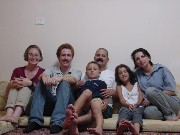 The
reason given has often been that the Syrians were shelling Israeli communities
in the north from the heights of their mountains (the tallest in the region).
While the Syrian shelling hasnít been disputed, the cause of it has - some
say Israelis attacked first in most of those cases - and others have supposed
that the extremely rich land and water resources of the Golan are the real
reason. The Arabs here - 18,000 - are mostly Druze (an offshoot of
Islam) and are fiercly loyal to Syria (one of the few Arab nations that
treated the Druze well). They barely outnumber the Israelis who have
since moved into the area - 15,000 - and live in one of the five villages
remaining from 1967. Their status is similar to that of Arab Jerusalemites
who have Israeli ID Cards but not citizenship or passports (they were offered
Israeli citizenship, but most refused out of allegiance to Syria).
We stayed with a lovely Druze family and their two children where we drank
Matte - a "traditional" Golani beverage (yerba matte, drunk as tea
with sugar, sucked through a straw/sieve-spoon contraption, and passed
clockwise around the circle at least two times) brought here one hundred
years ago by a few of their number who ventured off to Argentina. The
reason given has often been that the Syrians were shelling Israeli communities
in the north from the heights of their mountains (the tallest in the region).
While the Syrian shelling hasnít been disputed, the cause of it has - some
say Israelis attacked first in most of those cases - and others have supposed
that the extremely rich land and water resources of the Golan are the real
reason. The Arabs here - 18,000 - are mostly Druze (an offshoot of
Islam) and are fiercly loyal to Syria (one of the few Arab nations that
treated the Druze well). They barely outnumber the Israelis who have
since moved into the area - 15,000 - and live in one of the five villages
remaining from 1967. Their status is similar to that of Arab Jerusalemites
who have Israeli ID Cards but not citizenship or passports (they were offered
Israeli citizenship, but most refused out of allegiance to Syria).
We stayed with a lovely Druze family and their two children where we drank
Matte - a "traditional" Golani beverage (yerba matte, drunk as tea
with sugar, sucked through a straw/sieve-spoon contraption, and passed
clockwise around the circle at least two times) brought here one hundred
years ago by a few of their number who ventured off to Argentina. |
|
8/12/01: Somehow we managed not to comment on the beauty of this area yesterday. It is unbelievable with its mountains and valleys - not unlike Switzerland in the summertime, but a heck of a lot warmer. 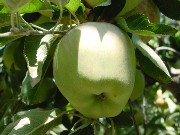 Very
lush and green, where apple trees grow - the main produce of the area.
We spent most of the day radiating in and out of Majdal Shems (Tower of
the Sun), the largest remaining Arab village. Very
lush and green, where apple trees grow - the main produce of the area.
We spent most of the day radiating in and out of Majdal Shems (Tower of
the Sun), the largest remaining Arab village. 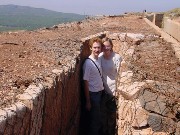 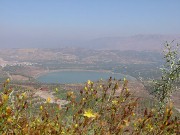 We
first went to an abandoned Israeli bunker, from which we could see the
other side of the disengagement line which is Syria (video
- 30 sec.) as well as Mount Hermon, mentioned often in the Bible for its
impressive heights (Psalm 133). Marthame noted that we could receive
signals from seven different cellphone systems from five different countries.
We then headed to the "shouting hill," a position right at the ceasefire
line (Israeli, Syrian, and UN posts are all well within view) where families
used to communicate with one another by loudspeaker across the border (video
- 25 sec). Since the advent of cellphones, people don't do this as much,
except on special occasions (esp. weddings), when they actually want to
see each other (through binoculars, of course). Strange and sad are
the unknown casualties of war, which brings us to our final stop - the We
first went to an abandoned Israeli bunker, from which we could see the
other side of the disengagement line which is Syria (video
- 30 sec.) as well as Mount Hermon, mentioned often in the Bible for its
impressive heights (Psalm 133). Marthame noted that we could receive
signals from seven different cellphone systems from five different countries.
We then headed to the "shouting hill," a position right at the ceasefire
line (Israeli, Syrian, and UN posts are all well within view) where families
used to communicate with one another by loudspeaker across the border (video
- 25 sec). Since the advent of cellphones, people don't do this as much,
except on special occasions (esp. weddings), when they actually want to
see each other (through binoculars, of course). Strange and sad are
the unknown casualties of war, which brings us to our final stop - the 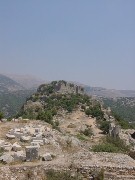 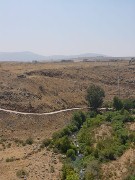 village
of Al-Ghayar just northeast of the Golan. In 1967, the Israelis assumed
it belonged to Lebanon and village
of Al-Ghayar just northeast of the Golan. In 1967, the Israelis assumed
it belonged to Lebanon and 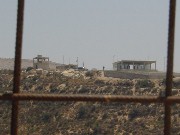 left
it alone. Instead, it had been a Syrian village and was now cut off
from the rest of Syria by the Israeli presence in the Golan. Now
it is under full Israeli military control and guarded by quite the bevy
of troops. From the other edge of town we could see the flag of Hezbollah
- the Syrian-funded guerrillas who work out of Southern Lebanon (video
- 25 sec.). We did go to one normal tourist site, the castle Nimrod (named
after the Biblical great-grandson of Noah who was "a mighty warrior" (Gen.
10:8). We read different accounts about its origins, either originally
built by the Crusaders or by Arabs; at any rate, it was used by many armies
and leaders before it fell into disrepair and was used to house livestock.
It still remains very grand, and the views are unparalleled. We then
caught our bus back to Jerusalem from the Jewish town of Kiryat Shmona,
driving through the Jordan Valley road (not the most comfortable route
in Israeli public transportation). On the road, most of us got calls
from friends in Birzeit worried about our well-being - apparently a suicide
bomber had been in Haifa, and there had been all kinds left
it alone. Instead, it had been a Syrian village and was now cut off
from the rest of Syria by the Israeli presence in the Golan. Now
it is under full Israeli military control and guarded by quite the bevy
of troops. From the other edge of town we could see the flag of Hezbollah
- the Syrian-funded guerrillas who work out of Southern Lebanon (video
- 25 sec.). We did go to one normal tourist site, the castle Nimrod (named
after the Biblical great-grandson of Noah who was "a mighty warrior" (Gen.
10:8). We read different accounts about its origins, either originally
built by the Crusaders or by Arabs; at any rate, it was used by many armies
and leaders before it fell into disrepair and was used to house livestock.
It still remains very grand, and the views are unparalleled. We then
caught our bus back to Jerusalem from the Jewish town of Kiryat Shmona,
driving through the Jordan Valley road (not the most comfortable route
in Israeli public transportation). On the road, most of us got calls
from friends in Birzeit worried about our well-being - apparently a suicide
bomber had been in Haifa, and there had been all kinds 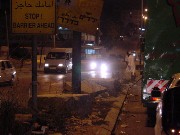 of
chaos at the Surda checkpoint - shooting, tear gas, etc. - for the last
two days. We werenít sure whether we should head back to Birzeit,
but decided to get to Ramallah, where the taxi drivers would know the situation.
At the Ar-Ram checkpoint just outside Jerusalem, we found ourselves in
a bottleneck of loud, unbearable traffic (audio
- 5 sec.). One of our group said, "This is just like New York, except
the person at the other end isnít carrying an M-16 -- usually." Most of
the group decided to head back to Birzeit (passing without incident), but
we decided to crash with a friend in Ramallah and head to Birzeit for class
in the morning. of
chaos at the Surda checkpoint - shooting, tear gas, etc. - for the last
two days. We werenít sure whether we should head back to Birzeit,
but decided to get to Ramallah, where the taxi drivers would know the situation.
At the Ar-Ram checkpoint just outside Jerusalem, we found ourselves in
a bottleneck of loud, unbearable traffic (audio
- 5 sec.). One of our group said, "This is just like New York, except
the person at the other end isnít carrying an M-16 -- usually." Most of
the group decided to head back to Birzeit (passing without incident), but
we decided to crash with a friend in Ramallah and head to Birzeit for class
in the morning. |
|
8/13/01: An Arab-wide strike was in effect today, including Birzeit, of course, so no class (thatís two days that we've lost due to the current situation). We laid low in Ramallah before heading to Jerusalem to meet a friend in town for a visit - great timing. She told us to meet her for lunch at the American Colony Hotel, and so we headed in (walking across at Qalandiya checkpoint). When we got close, we saw that a crowd was gathered around the American Colony (right by Orient House). Soldiers and police had barricaded the street, and there was a protest in action. We tried to get across the barricade and into the hotel, but were forbidden entry. As we looked for a phone number to call our friend, we heard a commotion as an Israeli policeman in uniform and one in plainclothes were dragging a man along the ground and into a police car. As the crowd rushed towards them, the plainclothesman threw a stun grenade - our way. It detonated about five feet from us (theyíre very loud). After a few minutes, we and our American passports argued our way across the barricade and found our friend chain-smoking nervously in the lobby. Soon after, the place was over-run by journalists (the American Colony is known as the place for journalists) - apparently the newsworthy bits had passed. The calm in the restaurant (delicious food, flowery gardens, tweeting birds) was quite a contrast with what we had walked through. After lunch we headed back, deciding we needed to get into Birzeit tonight rather than tomorrow morning. Qalandiya was normal, except for the glass bottle-throwing youth who were targeting Israeli jeeps on the road. Surda, however, was surreal - the general strike meant that there was no commuter traffic. The soldiers weren't letting anyone go through, except on the rare occasion (old people, mothers, etc.). So we had to wait a long time for a taxi to fill up. This kind of stuff gets really old once the excitement wears off, and once youíre actually going somewhere and not coming to see the action. We went and sat across from the Israeli soldiers' jeep. The soldiers stared at us and asked us what we were doing there. Marthame said we would leave when they let enough people through to fill up our taxi. They didnít seem to like that either, but it wasnít long before they let enough people through - maybe they were tired of us watching them. We returned and began to pack for Zababdeh, but found our water had run out again. Once again, someone had shut the valve on the roof. How annoying. |
|
8/14/01: - Elizabeth went into Ramallah to meet the head of environmental programs for the Latin Patriarchate school system and talk all things environmental. Then she returned to Birzeit for class, but our teacher couldn't make it across the checkpoint (three days now). We wanted to leave early for our overnight in Zababdeh, but there was a student-led protest headed to Surda from Birzeit. We decided to wait for the chaos to clear. When we arrived at Surda, we were getting out of the taxi when a tear gas cannister flew overhead. We jumped back in the car and rolled up the windows. The scene repeated itself, and we could see men and women covering their eyes, gagging, and vomiting. There seemed to be no purpose other than to move the taxis back from the checkpoint. We waited until it seemed quiet and crossed without a problem, made it to the car rental agency, picked up our car, and drove to Zababdeh. We took a different route than usual, having heard that Jenin had been invaded by Israeli tanks late last night. It was a wise choice, but it was still nerve-wracking to drive through parts of the West Bank - even the ones we know well. We had to argue our way across a checkpoint, but arrived safely and in time for Abuna Louis' farewell party. The party had been cancelled, however, due to a death in the village yesterday. The mother of good friends of ours was killed in a car accident on the road to Jenin. We visited the family and paid our respects, consoling our friends and drinking bitter coffee. |
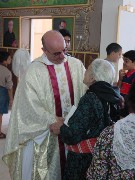 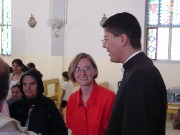 8/15/01:
This morning was Abuna Louis Hazboun's last Mass as the Roman Catholic
priest in Zababdeh. After six years here (which seems to be the standard
tour of duty for priests in the Latin Patriarchate), he has been moved
to Jaffa-Nazareth, within Israel proper. Many people came to wish
him well. It was also the first Mass for Abuna Aktham Hijaziin who
has spent the last three years in 'Aboud, a village near in Ramallah.
People also had the chance to welcome him to Zababdeh. He comes originally
from Jordan, as do many of the priests in the Latin Patriarchate of Jerusalem.
The Patriarchate covers Israel, Palestine, Jordan, and Cyprus. It
was a nice farewell, complete with Jenin's priest and nuns. After
lunch together (and helping Abuna Louis finish up the last minute packing
duties), we took off in a caravan of four cars for the Israeli border.
The sisters from Jenin went first in their white habits and Italian passports,
then the two Americans, then Abuna Louis with one of the sisters from Zababdeh,
and finally Abuna Aktham with another one of the sisters. When we
arrived outside of Zababdeh where Palestinian control ends and approached
the Israeli military camp, we could see that barbed wire had been scrolled
across the road. Abuna Louis and Marthame walked up 8/15/01:
This morning was Abuna Louis Hazboun's last Mass as the Roman Catholic
priest in Zababdeh. After six years here (which seems to be the standard
tour of duty for priests in the Latin Patriarchate), he has been moved
to Jaffa-Nazareth, within Israel proper. Many people came to wish
him well. It was also the first Mass for Abuna Aktham Hijaziin who
has spent the last three years in 'Aboud, a village near in Ramallah.
People also had the chance to welcome him to Zababdeh. He comes originally
from Jordan, as do many of the priests in the Latin Patriarchate of Jerusalem.
The Patriarchate covers Israel, Palestine, Jordan, and Cyprus. It
was a nice farewell, complete with Jenin's priest and nuns. After
lunch together (and helping Abuna Louis finish up the last minute packing
duties), we took off in a caravan of four cars for the Israeli border.
The sisters from Jenin went first in their white habits and Italian passports,
then the two Americans, then Abuna Louis with one of the sisters from Zababdeh,
and finally Abuna Aktham with another one of the sisters. When we
arrived outside of Zababdeh where Palestinian control ends and approached
the Israeli military camp, we could see that barbed wire had been scrolled
across the road. Abuna Louis and Marthame walked up 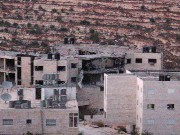 to
see if there were soldiers we could talk to and pass. When none appeared,
Marthame and Abuna Louis moved the barbed wire wide enough for cars to
pass through and headed off. When we got to the border, the Italian
sisters paved the way such that the soldier bid each of us "ciao" with
a wave of the hand when we passed. They didn't check our IDs, which was
a concern--Abuna Louis is a Palestinian and they are not usually letting
Palestinians through the border these days. He, like all the priests, has
a Vatican passport, but that is often of no use. But we passed totally
without incident, which was a relief. We stayed a while as Abuna
Louis got settled, but then headed back down to Jerusalem to turn in our
car rental. We heard that the last two days provided a great deal
of chaos at the Surda checkpoint (between Ramallah and Birzeit), and so
we decided not to risk going home to Birzeit in the dark and instead laid
low with friends in Ramallah for the night. On our way to their place
we rode past the police station which had been demolished a week ago in
response to the suicide bombing in Jerusalem. There's only so many
destroyed buildings one can look at. to
see if there were soldiers we could talk to and pass. When none appeared,
Marthame and Abuna Louis moved the barbed wire wide enough for cars to
pass through and headed off. When we got to the border, the Italian
sisters paved the way such that the soldier bid each of us "ciao" with
a wave of the hand when we passed. They didn't check our IDs, which was
a concern--Abuna Louis is a Palestinian and they are not usually letting
Palestinians through the border these days. He, like all the priests, has
a Vatican passport, but that is often of no use. But we passed totally
without incident, which was a relief. We stayed a while as Abuna
Louis got settled, but then headed back down to Jerusalem to turn in our
car rental. We heard that the last two days provided a great deal
of chaos at the Surda checkpoint (between Ramallah and Birzeit), and so
we decided not to risk going home to Birzeit in the dark and instead laid
low with friends in Ramallah for the night. On our way to their place
we rode past the police station which had been demolished a week ago in
response to the suicide bombing in Jerusalem. There's only so many
destroyed buildings one can look at. |
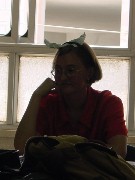 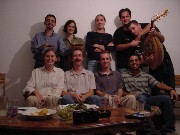 8/16/01:
Because our professor can't pass the Israeli checkpoint at Surda, our class
was moved to Ramallah today. That worked our well for us, since we
spent the night in Ramallah last night. We met in one of Birzeit's extension
locations. It was our last day of formal class, since the next week
will be exams. Unfortunately, we'll miss exams because we have to
be back in Zababdeh on Saturday. Today we presented sketches covering a
wide variety of our Arabic vocabulary for the year. Elizabeth's group
presented the life, death, and after-life of a typical rags to riches story.
Elizabeth played the parts of Gabriel and Satan with great gusto.
The hero of the story was given the eternal punishment of sitting next
to screaming children and in front of a smelly, crying baby on an airplane
(one of our chapters was on airport vocabulary). We headed back to
Birzeit and walked across the checkpoint with not even an ID check - things
have calmed down there today. We spent the rest of the day packing
and getting ready for leaving back to Zababdeh. A group of friends
from the University came over to say farewell, and we snacked, played games,
sang songs, and did a little dancing (video
- 10 sec.). It was a nice finale for our summer. 8/16/01:
Because our professor can't pass the Israeli checkpoint at Surda, our class
was moved to Ramallah today. That worked our well for us, since we
spent the night in Ramallah last night. We met in one of Birzeit's extension
locations. It was our last day of formal class, since the next week
will be exams. Unfortunately, we'll miss exams because we have to
be back in Zababdeh on Saturday. Today we presented sketches covering a
wide variety of our Arabic vocabulary for the year. Elizabeth's group
presented the life, death, and after-life of a typical rags to riches story.
Elizabeth played the parts of Gabriel and Satan with great gusto.
The hero of the story was given the eternal punishment of sitting next
to screaming children and in front of a smelly, crying baby on an airplane
(one of our chapters was on airport vocabulary). We headed back to
Birzeit and walked across the checkpoint with not even an ID check - things
have calmed down there today. We spent the rest of the day packing
and getting ready for leaving back to Zababdeh. A group of friends
from the University came over to say farewell, and we snacked, played games,
sang songs, and did a little dancing (video
- 10 sec.). It was a nice finale for our summer. |
|
8/17/01: Normally (i.e. before October last year), we'd be able to catch a bus or shared taxi that goes straight from the center of Ramallah to Zababdeh. The bus quit running the route with the closures of the seige, but a couple drivers still make the now long and bumpy trip. Although both Zababdeh and Ramallah are under "full" Palestinian control (that doesn't include the ground below or the sky above), they are not connected, which means the path between them is largely through areas B and C. With the current seige, entire stretches of the roads in areas B and C are dug up or riddled with checkpoints, boulders and cement blocks barring travel. Because of the circuitous route required now to get around, we had to go towards Jerusalem (the opposite direction from Zababdeh) to meet our driver from Zababdeh.With our big backpacks and luggage, we took an extra taxi from Ramallah to the Qalandiya checkpoint and walk across along with the rest of the taxi's passengers. We met him, happily put down our stuff and then headed down to the Jordan Valley Road (the same route we took two days ago in our car with Israeli plates). When we got to the same checkpoint, the cars were lined up and waiting. After forty minutes or so in the sun, the two of us decided to walk up to the checkpoint and see what the hold up was. We were held off by about one hundred yards and so raised our passports into the air. They still wouldn't let us approach, but at least deigned to answer us that we'd be moving in ten minutes. After ten minutes (OK, maybe twelve), we did indeed move. The soldier stopped our taxi and gave Marthame his word of advice: "Be patient." Such is the whimsy of the occupation. The taxis were waiting to pass from one side of the roadblock to the other. In between is a road that heads off to a settlement. No traffic was headed off to the settlement, and yet every car had to wait. It's possible that we would've waited another few hours (as we had before) if we hadn't pushed a little bit. We had lunch with our driver and his family once we arrived, which was really nice--they had one of our favorite dishes, maqlube, which means "upside-down." (It was his home that was hit in December by an 800mm shell that shattered a window and went through the family's kitchen and through two concrete walls into their bathroom.) He and his family are digging a water-reservoir by their house, as are most of the homes in Zababdeh - there has been little and often no water coming through the pipes this summer. |
|
8/18/01: Today was the first day back for the teachers in Zababdeh, and we gathered to get some words of instruction from the new director, Abuna Aktham, and the Vice-Director, Teacher Iyad, who is from Zababdeh. Last year he had been taking on the responsibilities of that job without being officially acknowledged as such - it's nice to see some official word here. As with any change, there is always a mixture of feelings, but for the most part there does seem to be a renewed energy and excitement to work with Abuna Aktham. We certainly hope that it carries over into the classroom. |
|
8/19/01: The first Sunday for Abuna Aktham, and he was received quite well by the congregation. Everyone seems intent on commenting on how young he is (he's 32, but looks younger), a real sea change for this village. Marthame stood with him at the table and helped to distribute the elements as he had with Abuna Louis. It's encouraging to see continuity with good ecumenical relations. We also got a chance to see the Episcopal Priest, Qassis Hossam. It was his first Sunday in Zababdeh in a few weeks - the last three he had been unable to travel here from Nablus, and so there had been no church. In the evening, we went to visit Abuna To'mie, the Orthodox priest. He had just returned from a visit of Palestinian clergy to Turkey. There were Roman Catholic, Orthodox, and Protestant pastors all traveling together to see some of the sites there. Particularly impressive were the ruins of Ephesus. He showed us his pictures, including one of him in his clergy robe (which he wears everywhere he goes) and a floppy tourist hat - Gilligan-style. That's gotta be a first. |
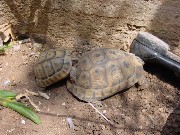 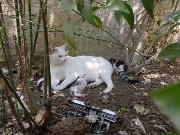 8/20/01:
Monday through Thursday means getting ready for school, which will start
on Saturday. Elizabeth will be teaching English (7th grade, some
classes with 11th grade, and some classroom assistance with grades 1-3),
and Marthame will be helping Abuna Aktham teach 9th-12th grade religion
class. We had a meeting with the English teachers today and touched
briefly on some potential activities for next year, including getting an
active English club up and running and how the two of us might best be
used as a resource for the rest of the teachers. We'll see what happens.
There shouldn't be any more meetings this week, but all teachers are supposed
to be at school from 9-12 each day in case somebody needs to do some planning.
In some ways the village is still operating the way it was five years ago,
before there were telephones. Nevertheless, it gives us the chance
to get prepared for classes. We had lunch today with some friends
in the village and played with their menagerie of cats and turtles.
Whenever we ask people if they name their "pets," they tell us the
Arabic translation of the animal - they think it's something bizarre to
give a human name to animals. 8/20/01:
Monday through Thursday means getting ready for school, which will start
on Saturday. Elizabeth will be teaching English (7th grade, some
classes with 11th grade, and some classroom assistance with grades 1-3),
and Marthame will be helping Abuna Aktham teach 9th-12th grade religion
class. We had a meeting with the English teachers today and touched
briefly on some potential activities for next year, including getting an
active English club up and running and how the two of us might best be
used as a resource for the rest of the teachers. We'll see what happens.
There shouldn't be any more meetings this week, but all teachers are supposed
to be at school from 9-12 each day in case somebody needs to do some planning.
In some ways the village is still operating the way it was five years ago,
before there were telephones. Nevertheless, it gives us the chance
to get prepared for classes. We had lunch today with some friends
in the village and played with their menagerie of cats and turtles.
Whenever we ask people if they name their "pets," they tell us the
Arabic translation of the animal - they think it's something bizarre to
give a human name to animals. |
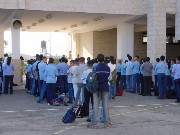 8/25/01:
The last four days have been spent getting ready for the first day of school
- we've had time at the school and at home to get prepared. Today
was day one, and as happened last year, we received our new schedules we
entered the school this morning. However, unlike last year, it appears
unlikely that there will be great changes between now and the end of the
year - already a vast improvement. The students were, for the most
part, on time (video - 14 sec.), as the
road has been opened between Zababdeh and Qabatiya. This makes this
a lot better for the busses and for the teachers who come by their own
cars. It was a remarkably unremarkable day, which says a lot these
days. The new principal, Abuna Aktham, has jumped into his job with
both feet and is taking to it with a great level of energy and strength.
Ahlan w sahlan! 8/25/01:
The last four days have been spent getting ready for the first day of school
- we've had time at the school and at home to get prepared. Today
was day one, and as happened last year, we received our new schedules we
entered the school this morning. However, unlike last year, it appears
unlikely that there will be great changes between now and the end of the
year - already a vast improvement. The students were, for the most
part, on time (video - 14 sec.), as the
road has been opened between Zababdeh and Qabatiya. This makes this
a lot better for the busses and for the teachers who come by their own
cars. It was a remarkably unremarkable day, which says a lot these
days. The new principal, Abuna Aktham, has jumped into his job with
both feet and is taking to it with a great level of energy and strength.
Ahlan w sahlan! |
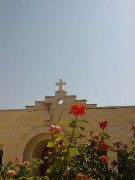 8/26/01:
We have begun in earnest our program of "church rotation" - that is, a
more intentional ministry of presence in each of the churches on Sunday.
Last Sunday, Marthame shared at the table with Abuna Aktham in the Latin
Church. This Sunday, he shared at the table with Qassis (that is,
Pastor) Hossam at the Anglican Church. Father Hossam came from Nablus
yesterday, having traveled the way everyone leaving Nablus to the north
do these days - by taking a taxi to the edge of the city, walking across
a dusty, bulldozed road, and taking another taxi on the other side.
Meanwhile, his car sits useless back in the city. After church, he
set out for the return journey to Nablus to his church there. We
made our way to Jenin, the city to our north and the main hub for this
agricultural region, to have lunch with a friend who works at the school
with us. 8/26/01:
We have begun in earnest our program of "church rotation" - that is, a
more intentional ministry of presence in each of the churches on Sunday.
Last Sunday, Marthame shared at the table with Abuna Aktham in the Latin
Church. This Sunday, he shared at the table with Qassis (that is,
Pastor) Hossam at the Anglican Church. Father Hossam came from Nablus
yesterday, having traveled the way everyone leaving Nablus to the north
do these days - by taking a taxi to the edge of the city, walking across
a dusty, bulldozed road, and taking another taxi on the other side.
Meanwhile, his car sits useless back in the city. After church, he
set out for the return journey to Nablus to his church there. We
made our way to Jenin, the city to our north and the main hub for this
agricultural region, to have lunch with a friend who works at the school
with us. 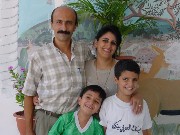 Her
family is one of the Christian families of the city, a population of about
600 in a city of 70,000. Unlike some other cities, though, they are
not concentrated in any one neighborhood - rather they live all over the
town. We're not sure of the history of Christians here, but it seems
that many of them came recently (within the last 40-50 years) from other
towns and villages to take advantage of the employment and service opportunities
available in the city. Our taxi driver dropped us off at the wrong
house - the woman who answered the door seemed a little startled by the
presence of two foreigners and gave us directions to our friend's house
in Hebrew...We had a wonderful visit, as we played with their children
and listened to our friend's father-in-law regale us with his stories of
living as the only Christian in various Muslim towns around the area.
It was encouraging for many reasons, one of them being that our Arabic
has clearly improved. But it was sobering to hear their stories of
what it was like to huddle together on the floor as Israeli tanks rolled
into Jenin a few weeks ago just a few blocks from their home. Her
family is one of the Christian families of the city, a population of about
600 in a city of 70,000. Unlike some other cities, though, they are
not concentrated in any one neighborhood - rather they live all over the
town. We're not sure of the history of Christians here, but it seems
that many of them came recently (within the last 40-50 years) from other
towns and villages to take advantage of the employment and service opportunities
available in the city. Our taxi driver dropped us off at the wrong
house - the woman who answered the door seemed a little startled by the
presence of two foreigners and gave us directions to our friend's house
in Hebrew...We had a wonderful visit, as we played with their children
and listened to our friend's father-in-law regale us with his stories of
living as the only Christian in various Muslim towns around the area.
It was encouraging for many reasons, one of them being that our Arabic
has clearly improved. But it was sobering to hear their stories of
what it was like to huddle together on the floor as Israeli tanks rolled
into Jenin a few weeks ago just a few blocks from their home. |
|
8/27/01: Another "ordinary" school day. Marthame was at home preparing for classes (and sleeping late, truth be told) when he heard the bell from the Anglican Church tolling for a funeral. Funerals usually happen the day of or the day after a death, and this is how they are announced to the village. He hurried to get ready to go to church when the Latin Church tolled for a funeral as well. Something was clearly up. Young men were gathering in trucks, red flags flying, shouting into megaphones laden with feedback. Abu 'Ali Mustafa had been assassinated just a few minutes earlier in Ramallah, and word spread like wildfire. He was the leader of the PFLP, the Popular Front for the Liberation of Palestine, a Marxist organization - their offices often contain images of Che Guevara. Last year, Abu 'Ali Mustafa had spent time in Zababdeh, and in October there was a PFLP march in Zababdeh. Apparently, compared to other political parties in Palestine, PFLP has a high proportion of Christians. One teacher at school said that this assassination was sending a message of Israeli prowess to Christian Palestinians (as if the destruction in Beit Jala/Beit Sahour/Bethlehem were not enough). This assassination, shocked and angered the people we talked to here. And us too. The PFLP, once known for its hijacking of Israeli airliners, has - in the current Intifada and siege - focused its military efforts on Israeli military targets within the occupied Gaza Strip and West Bank. From what we have heard, they consider attacks on civilians, the bread and butter of Islamic Jihad and Hamas, as a wrong-headed strategy. However, the distinction they draw in tactic, the distinction many define as between freedom fighting and terrorism, is lost as a blunt equation is drawn between terrorism and any violent Palestinian resistance. And so there were the Israeli spokespeople on TV, defending his murder by calling him a terrorist, whose "resume was soaked in the blood of Israeli and Jewish women and children." Spokespeople who did their best (and judging from the world's response, it was a good job) to defend their illegal extrajudicial assassination of a political leader. Unbelievable. Stores closed immediately. We then heard on the news about the re-occupation of Beit Jala, in particular the Israeli army's use of the Lutheran Church as a military outpost. Despicable. |
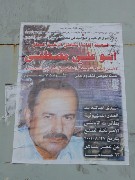 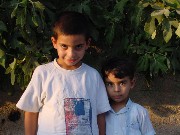 8/28/01:
Most everything was closed today because of the assassination yesterday.
One exception was the school, but most of the students and teachers came
(to our surprise), and classes went along as usual. We later realized
that this is because Palestinian government schools have not opened yet,
and so the Ministry of Education would not have called for a strike and
closure. Posters were up all over town already, with pictures of
Abu 'Ali Mustafa. The IDF is still in Beit Jala, and gun-battles
are in the streets of that Christian village. Our inbox is clogged
with pleas for help, to call/fax/email Israeli and American leaders and
officials to stop this reoccupation and escalation of the conflict, particularly
pointing out the occupation of the Lutheran church and orphanage.
In the evening, we made a few visits to reconnect with families we hadn't
seen much of recently. Their kids were all anxious to have their
pictures taken, but the talk among the adults was of politics and fear
and getting the heck out of here. Through all of our visits, the
sound of Israeli military aircraft roared above. We all knew that they
wouldn't be doing anything in our town, and we were so thankful that we
had that assurance, unlike so many people on the West Bank and Gaza.
Instead, we postulated about where they were headed, but didn't find out
anything from the news - perhaps peeking in on Beit Jala. Maybe the
grassroots call for faxes and emails had effect, as the US mentioned the
Lutheran Church and orphanage in its word to Israel to withdraw.
We'll see what is heeded... 8/28/01:
Most everything was closed today because of the assassination yesterday.
One exception was the school, but most of the students and teachers came
(to our surprise), and classes went along as usual. We later realized
that this is because Palestinian government schools have not opened yet,
and so the Ministry of Education would not have called for a strike and
closure. Posters were up all over town already, with pictures of
Abu 'Ali Mustafa. The IDF is still in Beit Jala, and gun-battles
are in the streets of that Christian village. Our inbox is clogged
with pleas for help, to call/fax/email Israeli and American leaders and
officials to stop this reoccupation and escalation of the conflict, particularly
pointing out the occupation of the Lutheran church and orphanage.
In the evening, we made a few visits to reconnect with families we hadn't
seen much of recently. Their kids were all anxious to have their
pictures taken, but the talk among the adults was of politics and fear
and getting the heck out of here. Through all of our visits, the
sound of Israeli military aircraft roared above. We all knew that they
wouldn't be doing anything in our town, and we were so thankful that we
had that assurance, unlike so many people on the West Bank and Gaza.
Instead, we postulated about where they were headed, but didn't find out
anything from the news - perhaps peeking in on Beit Jala. Maybe the
grassroots call for faxes and emails had effect, as the US mentioned the
Lutheran Church and orphanage in its word to Israel to withdraw.
We'll see what is heeded... |
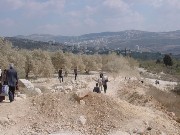 8/29/01:
Beit Jala still sounds desperate. This morning we talked by phone
with an American friend who lives in Beit Jala. Yesterday, she and
her husband packed a car during a lull in the fighting. During another
lull, they and their kids headed to Bethlehem and grabbed a spot on the
floor with some friends. 8/29/01:
Beit Jala still sounds desperate. This morning we talked by phone
with an American friend who lives in Beit Jala. Yesterday, she and
her husband packed a car during a lull in the fighting. During another
lull, they and their kids headed to Bethlehem and grabbed a spot on the
floor with some friends.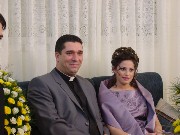 Today,
it sounds like the decision was wise - the battles are now taking place
in front of their house in Beit Jala. Her husband today went out
to by the last remaining milk in Bethlehem (the man who brings milk to
Bethlehem lives in Beit Jala and has spent the last few days crouched on
the floor of his home) to feed their two small children. Unbelievable...After
school, we headed off for Nablus - a social engagement brought us there,
and while we were anxious about traveling, we had checked with many people
to see how the roads were. The half-hour journey now takes an hour
and a half, and instead of going to the checkpoint and walking across (as
was the only option for us in Birzeit), most taxis go up into the mountains,
drop people off, and then folks walk about a quarter of a mile over a bulldozed
road to the next row of waiting taxis. It was incredible to see old
men and women making the journey on foot - quite steep and slippery at
times. The roads from Zababdeh to Nablus briefly passes through Today,
it sounds like the decision was wise - the battles are now taking place
in front of their house in Beit Jala. Her husband today went out
to by the last remaining milk in Bethlehem (the man who brings milk to
Bethlehem lives in Beit Jala and has spent the last few days crouched on
the floor of his home) to feed their two small children. Unbelievable...After
school, we headed off for Nablus - a social engagement brought us there,
and while we were anxious about traveling, we had checked with many people
to see how the roads were. The half-hour journey now takes an hour
and a half, and instead of going to the checkpoint and walking across (as
was the only option for us in Birzeit), most taxis go up into the mountains,
drop people off, and then folks walk about a quarter of a mile over a bulldozed
road to the next row of waiting taxis. It was incredible to see old
men and women making the journey on foot - quite steep and slippery at
times. The roads from Zababdeh to Nablus briefly passes through 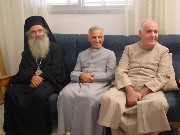 Israeli-controlled
Area C. This part is now forbidden to Palestinians. Regardless,
we arrived at the Anglican Church compound to reconnect with some friends
we met the last time we were there. We cleaned up a bit, shined our
shoes (to get the dust off), and headed off for the engagement party of
the Anglican priest, Fr. Hossam (he also serves in Zababdeh and so regularly
makes this dusty journey). His family was able to get in from Israel
(from Shefa'amer, where we visited in March)
after Fr. Hossam Israeli-controlled
Area C. This part is now forbidden to Palestinians. Regardless,
we arrived at the Anglican Church compound to reconnect with some friends
we met the last time we were there. We cleaned up a bit, shined our
shoes (to get the dust off), and headed off for the engagement party of
the Anglican priest, Fr. Hossam (he also serves in Zababdeh and so regularly
makes this dusty journey). His family was able to get in from Israel
(from Shefa'amer, where we visited in March)
after Fr. Hossam 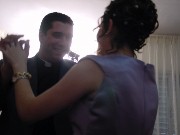 talked
with the Israeli military for an hour. However, the Anglican Bishop
could not make it from Jerusalem, and so the engagement ceremony was performed
by two Greek Orthodox priests, Abuna George in Arabic (audio
- 11 sec.) and Abuna Justinus in Greek (audio
- 5 sec.), in the name of the Orthodox Patriarchate. The Latin priest
and Melkite priest were also there, so it was quite the ecumenical affair.
After the ceremony, in which they exchange rings and gifts, we ate and
ate and danced and danced (video - 8 sec.).
It was an incredible treat to get to attend the ceremony, particularly
considering that they had to postpone it a few weeks ago due to the rapidly-deteriorating
situation in Nablus. We went back to the Anglican Church compound
and sat outside with the family who takes care of it and talked - what
else - politics. They asked a lot of questions about the American
government's role in the crisis here, and there was very little we had
to give in the way of encouragement - or even rationale. We fell
asleep listening for the latest news from Beit Jala. talked
with the Israeli military for an hour. However, the Anglican Bishop
could not make it from Jerusalem, and so the engagement ceremony was performed
by two Greek Orthodox priests, Abuna George in Arabic (audio
- 11 sec.) and Abuna Justinus in Greek (audio
- 5 sec.), in the name of the Orthodox Patriarchate. The Latin priest
and Melkite priest were also there, so it was quite the ecumenical affair.
After the ceremony, in which they exchange rings and gifts, we ate and
ate and danced and danced (video - 8 sec.).
It was an incredible treat to get to attend the ceremony, particularly
considering that they had to postpone it a few weeks ago due to the rapidly-deteriorating
situation in Nablus. We went back to the Anglican Church compound
and sat outside with the family who takes care of it and talked - what
else - politics. They asked a lot of questions about the American
government's role in the crisis here, and there was very little we had
to give in the way of encouragement - or even rationale. We fell
asleep listening for the latest news from Beit Jala. |
|
8/30/01: Apparently the Israeli army evacuated Beit Jala this morning, much to everyone's relief. Elizabeth evacuated Nablus, leaving early enough to get back in time to teach her classes at the school. Marthame's new schedule this year means that he has no lessons on Thursdays, and so he stayed a little later in Nablus to take care of some unfinished business. First, he went to visit the Mother Theresa 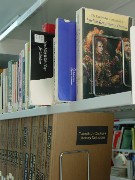 Missionaries
of Charity convent, where we had visited
upon first arriving in Palestine, to say hello. We also brought them
some pictures from the Sisters in Baghdad, whom we visited in May
during the Peace Conference. (We had a nice time with them in Baghdad and
brought them some food and greetings from the Sisters in Nablus.)
The sisters in Nablus were anxious to hear updates, as many of them have
served together in other Middle Eastern locales. Right now, even
with the situation here, it seems as though the situation in Baghdad is
one of the more difficult ministries of the order right now. Marthame
also visited with Abuna Dominick, who told Marthame stories from the 1967
War, when he was priest of Zababdeh. When the Israeli soldiers captured
the West Bank, they entered Zababdeh and brought all of the men of the
village together at the Latin Church and lined them up against the wall
to search them. They said if they found any weapon, even a razor
blade, "that was it." They then took four men from the village with
them down towards the Boys' School, and made them dig a hole then stand
in it to see if it was deep enough. Then the soldiers told the men
to go into the school. Inside they were told to bring out four dead Arab
soldiers. The frightened men were relieved to see that they had dug the
grave for these soldiers and not themselves. The people of Zababdeh,
and across the West Bank and Gaza, did not know that the Israeli soldiers
were under strict orders not to kill them. For them, the memories of 1948
and its massacres were still very fresh, and they were terrified. These
actions, while they did not harm the people, clearly seemed meant to frighten
and intimidate them. Unfortunately, Marthame did not have very much
time to visit with the sisters - they were working on getting one of the
children in their care to the hospital in Tel Aviv, a near impossibility
given the closures of roads and particularly of Nablus. Marthame
then headed off to the British Council, which maintains a resource office
nearby, and borrowed some reasources for English language teaching, for
possible activities of the English Club, and just for some plain old fun.
He then headed over to the Old City of Nablus to meet up with our hosts
and to visit their gold store. He had asked them to help him find
a chain for a cross he got in Bethlehem, which they did. After some
more political conversations, revolving around the American government
again, they refused (despite superhuman efforts on Marthame's part) to
let him pay. Missionaries
of Charity convent, where we had visited
upon first arriving in Palestine, to say hello. We also brought them
some pictures from the Sisters in Baghdad, whom we visited in May
during the Peace Conference. (We had a nice time with them in Baghdad and
brought them some food and greetings from the Sisters in Nablus.)
The sisters in Nablus were anxious to hear updates, as many of them have
served together in other Middle Eastern locales. Right now, even
with the situation here, it seems as though the situation in Baghdad is
one of the more difficult ministries of the order right now. Marthame
also visited with Abuna Dominick, who told Marthame stories from the 1967
War, when he was priest of Zababdeh. When the Israeli soldiers captured
the West Bank, they entered Zababdeh and brought all of the men of the
village together at the Latin Church and lined them up against the wall
to search them. They said if they found any weapon, even a razor
blade, "that was it." They then took four men from the village with
them down towards the Boys' School, and made them dig a hole then stand
in it to see if it was deep enough. Then the soldiers told the men
to go into the school. Inside they were told to bring out four dead Arab
soldiers. The frightened men were relieved to see that they had dug the
grave for these soldiers and not themselves. The people of Zababdeh,
and across the West Bank and Gaza, did not know that the Israeli soldiers
were under strict orders not to kill them. For them, the memories of 1948
and its massacres were still very fresh, and they were terrified. These
actions, while they did not harm the people, clearly seemed meant to frighten
and intimidate them. Unfortunately, Marthame did not have very much
time to visit with the sisters - they were working on getting one of the
children in their care to the hospital in Tel Aviv, a near impossibility
given the closures of roads and particularly of Nablus. Marthame
then headed off to the British Council, which maintains a resource office
nearby, and borrowed some reasources for English language teaching, for
possible activities of the English Club, and just for some plain old fun.
He then headed over to the Old City of Nablus to meet up with our hosts
and to visit their gold store. He had asked them to help him find
a chain for a cross he got in Bethlehem, which they did. After some
more political conversations, revolving around the American government
again, they refused (despite superhuman efforts on Marthame's part) to
let him pay. 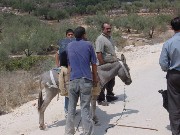 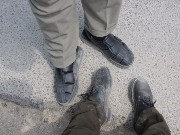 Now
the meaning of humility is clear. Marthame and Fr. Hossam then made
the journey back to Zababdeh together, forgoing the donkeys you can hire
to carry you or your bags across the destroyed road. It would've
save some time for shoe cleaning, though...We then visited with some folks
in the village, including one young man who wants to go to the States and
wants our help. These requests are increasingly frequent, and a little
sad, as many folks don't quite understand how the American system works,
and that knowing an American isn't necessarily of any use. It's also
depressing, as it shows that the violence and economic stagnation and hopelessness
of the Occupation is continuing to drive people out of their homeland.
In Zababdeh (and Beit Jala and Beit Sahour and Bethlehem), we see it threatening
to eliminate the Christian presence here even faster than before.
We capped off an exhausting day by visiting Abuna Aktham, the new Latin
priest, and talking to him about our vision for this place and our work
here. It was a very good visit, and we are looking forward to working
with him over the next few years. Now
the meaning of humility is clear. Marthame and Fr. Hossam then made
the journey back to Zababdeh together, forgoing the donkeys you can hire
to carry you or your bags across the destroyed road. It would've
save some time for shoe cleaning, though...We then visited with some folks
in the village, including one young man who wants to go to the States and
wants our help. These requests are increasingly frequent, and a little
sad, as many folks don't quite understand how the American system works,
and that knowing an American isn't necessarily of any use. It's also
depressing, as it shows that the violence and economic stagnation and hopelessness
of the Occupation is continuing to drive people out of their homeland.
In Zababdeh (and Beit Jala and Beit Sahour and Bethlehem), we see it threatening
to eliminate the Christian presence here even faster than before.
We capped off an exhausting day by visiting Abuna Aktham, the new Latin
priest, and talking to him about our vision for this place and our work
here. It was a very good visit, and we are looking forward to working
with him over the next few years. |
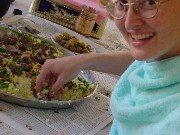 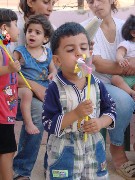 8/31/01:
After a leisurely, lazy Friday morning, we headed down to Tubas
to visit a friend and fellow teacher at the school. Several times
we have been there before, but getting there on a Friday is tricky business
- no taxis and not much traffic, being the Muslim holy day. We eventually
hitched a ride (hitching is quite common here) with a man who works in
Jenin and lives in Tubas. We chatted about the situation, about politics
(surprise, surprise), and he dropped us off on his way. Our lunch
in Tubas was a traditional meal of Mansaaf - bread with rice, meat, almonds,
and a yogurt sauce on top. And, we ate it traditionally - with our
bare hands! It was quite delicious, but eating such HOT food
like that makes you wonder if Palestinian fingers are made of asbestos.
Now we know how folks here can hold those little glasses of boiling tea
without a problem. He and his brother have found some ruins beneath their
house, and one day we hope to go back and visit them (when we're wearing
more appropriate clothes - not sure a clergy collar is appropriate attire
for spelunking). We returned to find folks sitting on our porch,
a welcome sight - it is quite public, and it gives us the feeling of being
very welcome here. There were many children, and so we took the opportunity
to share gifts we picked up at the PCUSA
offices in June - 8/31/01:
After a leisurely, lazy Friday morning, we headed down to Tubas
to visit a friend and fellow teacher at the school. Several times
we have been there before, but getting there on a Friday is tricky business
- no taxis and not much traffic, being the Muslim holy day. We eventually
hitched a ride (hitching is quite common here) with a man who works in
Jenin and lives in Tubas. We chatted about the situation, about politics
(surprise, surprise), and he dropped us off on his way. Our lunch
in Tubas was a traditional meal of Mansaaf - bread with rice, meat, almonds,
and a yogurt sauce on top. And, we ate it traditionally - with our
bare hands! It was quite delicious, but eating such HOT food
like that makes you wonder if Palestinian fingers are made of asbestos.
Now we know how folks here can hold those little glasses of boiling tea
without a problem. He and his brother have found some ruins beneath their
house, and one day we hope to go back and visit them (when we're wearing
more appropriate clothes - not sure a clergy collar is appropriate attire
for spelunking). We returned to find folks sitting on our porch,
a welcome sight - it is quite public, and it gives us the feeling of being
very welcome here. There were many children, and so we took the opportunity
to share gifts we picked up at the PCUSA
offices in June - 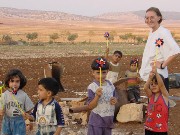 namely,
pinwheels. They were a big hit at first, the kids standing still
and quiet and watching the pinwheels spin in the wind. Very zen.
But then word got out, and we were besieged by requests for pinwheels!
Our reputation precedes us... namely,
pinwheels. They were a big hit at first, the kids standing still
and quiet and watching the pinwheels spin in the wind. Very zen.
But then word got out, and we were besieged by requests for pinwheels!
Our reputation precedes us... |
|
|